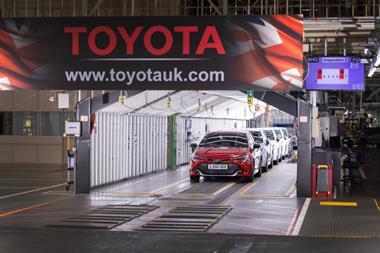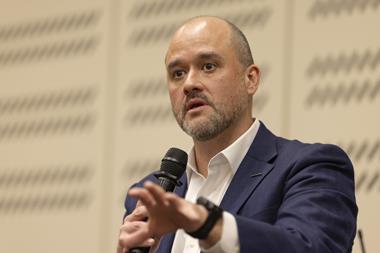 A pilot project at Audi to 'geo-fence' trucks and further automate their check-in for delivery of inbound material at the carmaker's Ingolstadt factory in Bavaria has won the 2014 Volkswagen Group Logistics Innovation award. The prize was given out during a group-wide logistics conference held in Kassel, Germany, which featured more than 250 logistics experts from more than 50 global locations across the Volkswagen Group's brands and factories.
A pilot project at Audi to 'geo-fence' trucks and further automate their check-in for delivery of inbound material at the carmaker's Ingolstadt factory in Bavaria has won the 2014 Volkswagen Group Logistics Innovation award. The prize was given out during a group-wide logistics conference held in Kassel, Germany, which featured more than 250 logistics experts from more than 50 global locations across the Volkswagen Group's brands and factories.
The geo-fencing project, called 'Quick Check-in', involves a simple smartphone app that uses GPS technology to verify the position of incoming trucks, and connects to Audi's control system for checking in material at the plant. The system allows trucks that adhere to Audi's delivery and production schedule to bypass the entry gate and move directly to the plant dock or the logistics centre adjacent to the factory without any extra paperwork or stopping.
According to Johannes Marschall, head of plant logistics for Audi at Ingolstadt, the Quick Check-in approach has been developed as a means to cope with an increasing number of truck deliveries, which are the result of both growing production and a rise in part numbers, the latter of which have more than doubled for Ingolstadt from around 10,000 in 2005 to 25,000 today. Ingolstadt now receives around 650 trucks per day to its docks or to the adjacent logistics centre, with production running on three shifts and output of around 2,600 vehicles per day.
Quick Check-in connects the plant to incoming material via mobile and satellite technology before arrival, geo-fencing the trucks at three distance points. Drivers scan the delivery with their smartphone upon pickup; then, when the truck is 50km (30 miles) from Ingolstadt, the app communicates with Audi's IT system. "At this point we can see if the truck is on time, and we can decide whether we are going to be able to level the delivery and production according to the plan, or if we need to switch around the truck delivery," Marschall told Automotive Logistics during an interview at Audi's headquarters in Ingolstadt.
Further readings are taken once the truck is 20km away, and again at a 3km distance, with each location and timing checked against the plant's disposition logistics schedule. At the 3km mark, if the truck corresponds to the schedule, the material's internal status is automatically switched from 'in transit' to 'in plant’, said Marschall.
"Then the truck doesn't have to go through any further arrival process, but goes directly to the unloading area at the plant, or into the GVZ [logistics centre]," he said.
"The final control of the trucks in the event of any discrepancies is carried out just as automatically as the subsequent registration stages," added Dr Michael Hauf, executive director of brand logistics at Audi, "right through to automated material booking without calling the truck control centre."
The system has the potential to eliminate considerable paperwork and manual check-in processes, allowing just-in-time and just-in-sequence deliveries to arrive within more accurate time windows.
"This is all managed by a small app that you can have on any smartphone the driver carries," Hauf told Automotive Logistics. "There is no need for RFID or other high tech equipment."
Based on its success in Ingolstadt, Audi will be looking to roll out the use of the 'quick check-in' at other Audi plants, said Hauf. The recognition of the system at the group level suggests that it could have potential across other global Volkswagen plants and logistics facilities.

The Volkswagen Group Logistics awards were voted during a recent innovation workshop at the group’s Kassel plant that was focused on resource-efficient logistics.
“New concepts and ideas are an important part of our work and crucial for efficient and innovative logistics in the Volkswagen Group,” said Thomas Zernechel, head of Volkswagen Group Logistics, in a prepared statement. “It is our responsibility, together with the brands within the group, to improve processes continuously and to set trends in logistics. The exchange of knowledge within the group and the networking between them are crucial drivers.”
A number of other logistics concepts and projects were presented during the workshop. Truck and bus manufacturer MAN, for example, demonstrated a new IT system for outbound shipment verification. Other innovations included a water-free, anti-corrosion protection and cleaning process for components, as well as fuel cell-powered material handling equipment in passenger car plants that reduce emissions and charging times.


































